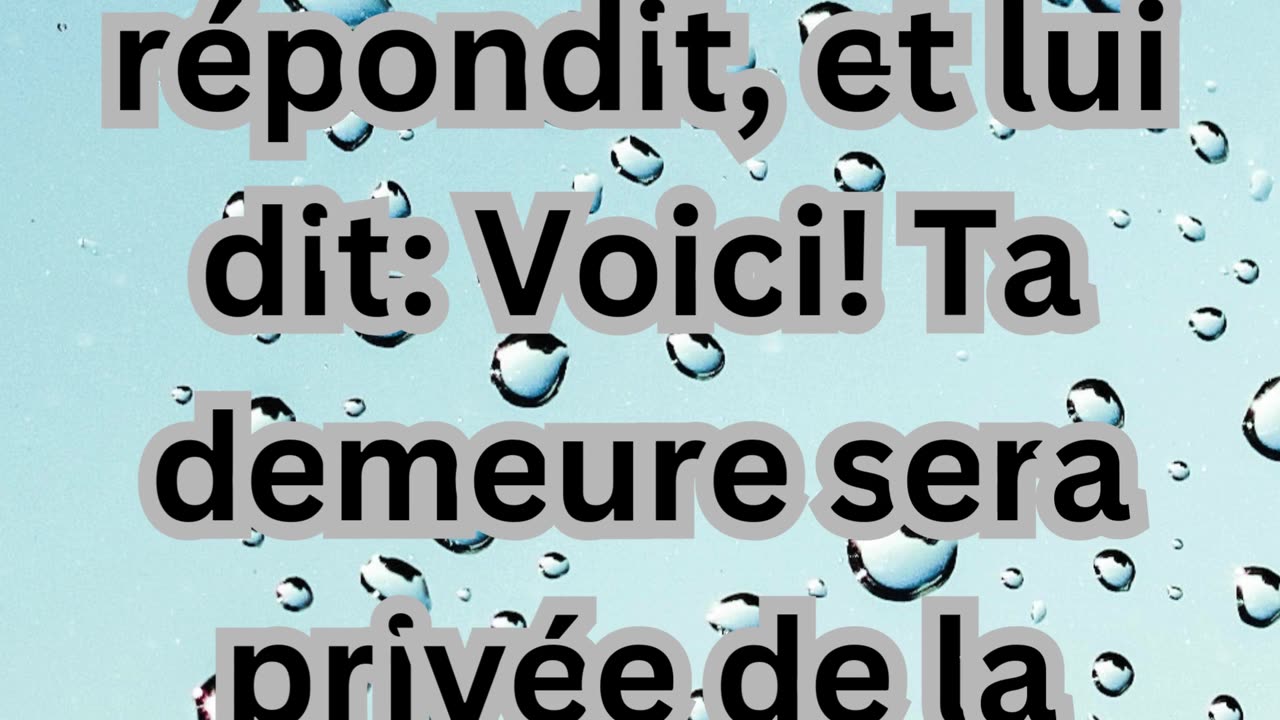Premium Only Content

"La Bénédiction d'Ésaü: Une Destinée Rugueuse"GENÈSE 27:39 40
Genesis 27:39-40 in French-Canadian Context
Genesis 27:39-40 (Louis Segond Translation)
39 Isaac, son père, répondit, et lui dit: Voici! Ta demeure sera privée de la graisse de la terre, Et de la rosée du ciel, d'en haut.
40 Tu vivras de ton épée, Et tu seras asservi à ton frère; Mais en errant librement ça et là, tu briseras son joug de dessus ton cou.
In these verses, Isaac speaks to Esau after the blessing originally intended for him has been given to his brother Jacob. This passage is a pivotal moment that sets the stage for Esau’s future and his relationship with his brother.
Title Suggestions and Their Rationale:
"La Bénédiction d'Ésaü: Une Destinée Rugueuse"
Translation: "Esau's Blessing: A Rugged Destiny"
Rationale: This title reflects the dual nature of Isaac’s words to Esau. While it's called a "blessing," it predicts a difficult and challenging life. Esau is told he will live away from the richness of the land and will have to rely on his sword, indicating a life of struggle and conflict. This captures the essence of the prophecy and highlights the contrast between Esau's fate and the more prosperous destiny of his brother Jacob.
"La Prophétie d'Isaac pour Ésaü"
Translation: "Isaac's Prophecy for Esau"
Rationale: This title is more neutral and straightforward, focusing on the act of prophecy itself. It emphasizes that Isaac is foretelling Esau’s future, which involves living in difficult conditions and being subservient to his brother, though with a potential for future liberation. This title is factual and captures the nature of Isaac's words without delving into the emotional or qualitative aspects of Esau's destiny.
Context and Themes in Genesis 27:39-40
These verses are a crucial part of the narrative where Isaac inadvertently gives his blessing to Jacob, leading Esau to seek a blessing for himself. The content of Esau's blessing from Isaac can be summarized as follows:
Deprivation: Esau's dwelling will be "privée de la graisse de la terre," meaning it will lack the fertility and abundance that often symbolize prosperity.
Conflict and Survival: The phrase "tu vivras de ton épée" implies that Esau's life will be marked by strife and self-reliance, often interpreted as a life of a warrior or one who survives through constant conflict.
Subjugation and Potential Liberation: Esau will serve his brother Jacob but is also given hope that he will eventually "briseras son joug de dessus ton cou," meaning he will break free from his brother’s dominance.
Cultural and Linguistic Considerations
French-Canadian Nuances:
In Quebec and among French-speaking Canadians, the language and cultural context can add subtle nuances to biblical interpretations. French-Canadian expressions might emphasize the ruggedness of Esau’s life ("destinée rugueuse") in a way that resonates with the cultural value placed on resilience and perseverance in the face of adversity.
Translation Style:
The Louis Segond translation, often used in French-speaking regions, is known for its formal and somewhat poetic language. In a French-Canadian context, a title that reflects this tone while also connecting with contemporary sensibilities can help make the passage more relatable and impactful.
Conclusion
Both title suggestions aim to capture the essence of the passage:
"La Bénédiction d'Ésaü: Une Destinée Rugueuse" emphasizes the paradox of Esau’s blessing, highlighting the harsh reality of his foretold life.
"La Prophétie d'Isaac pour Ésaü" offers a straightforward depiction of Isaac's words, focusing on the prophetic nature of the verses.
Choosing between them depends on whether you want to emphasize the hardship and struggle in Esau's future or maintain a more neutral, descriptive tone.
-
 LIVE
LIVE
The Jimmy Dore Show
11 minutes agoFacebook ROBS Water & Power From Small Georgia Town! New FDA Head Drops Bombshells! w/ Kim Bright
5,327 watching -
 LIVE
LIVE
Stephen Gardner
26 minutes ago🔴TRUMP CURSE: Letitia James PANICS as ALL Documents made public!
4,208 watching -
 UPCOMING
UPCOMING
Nerdrotic
38 minutes agoFantastic 4 HER! Daredevil BORE Again SUCKS! Disney Star Wars is DESPERATE | FNT Vegas 350
-
 LIVE
LIVE
Barry Cunningham
4 hours agoPRESIDENT TRUMP AND EL SALVADOR PRESIDENT NAYIB BUKELE PUT THE DEMOCRATS IN CHECKMATE!
12,766 watching -
 13:48
13:48
T-SPLY
2 hours agoEL SALVADOR TRIP FLOPS: Senator Slammed Hard!
4.99K16 -
 LIVE
LIVE
MrR4ger
20 hours agoBRAND NEW RPG - MANDRAGORA *ENTER FAELDUUM*
533 watching -
 LIVE
LIVE
Crypto Power Hour
3 hours ago $0.77 earnedFrom Wall Street Algorithms to Blockchain Disruption
189 watching -
 LIVE
LIVE
SilverFox
15 hours ago🔴LIVE - HUGE UPDATE! LORDS OF THE FALLEN 2.0
438 watching -
 4:38:41
4:38:41
Viss
5 hours ago🔴LIVE - Taking Wins all Over The PUBG Battleground!
34.3K2 -
 1:44:58
1:44:58
The Quartering
4 hours agoKarmelo Anthony Supporters SWAT Victims Dad, Hatchet Victim Dies, FSU School Shooter Update & More
112K77